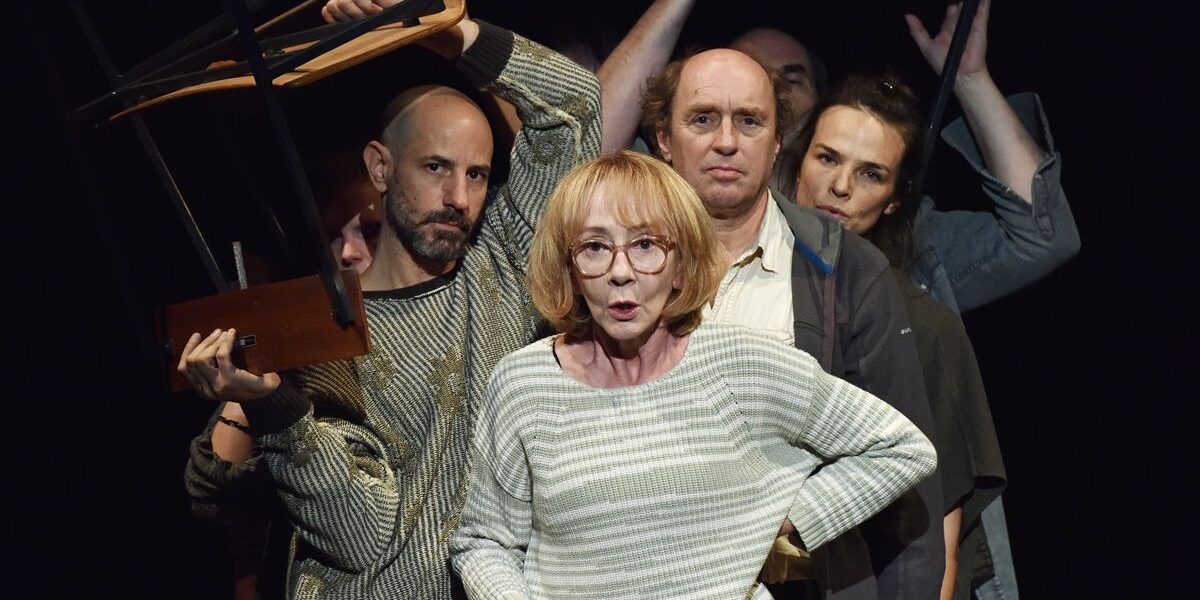SNG Drama Ljubljana, premiere 3rd December 2022
Young European millennials and older Gen Z generations – those born between 1985 and 2002 – were born into a time of multiple, intersecting financial, societal and political crises. We were raised in an anxious environment. Our future is unpredictable and the world seems to be falling apart, it feels like everything is on the edge of the end. Yet we have to survive somehow, care for our personal lives, work toward a career or an education and all the while maintain a relatively happy exterior. What happens when that comes crashing down? Whether because of an extreme life crisis or something that seems small but we secretly care about greatly.
The latter is what happened in How a Tree Fell, written by Katarina Morano and directed by Źiga Divjak, an established collaborative duo on the Slovenian scene. How a Tree Fell follows a young man named Jaka, played by Timon Šturbej. At first, we get to know everybody but him, the people who he is close to and who care about him. It is clear that something happened to Jaka that hurt and scared them greatly. Yet we are first shown the dynamics between them and their relationships in a humorous, subtle manner. Although there is a lot of well-handled exposition, it is not obtrusive. The introduction might seem a bit artificial, with the actors sitting on chairs in a row, facing the audience and speaking to them directly. But the authenticity with which they portray their moments of stress is enough to convince us they really care about the person they are discussing.
Jaka, however, cares about a tree. He likes to sit on it and just watch people, or think. It is his favourite place of all. So when it becomes clear the tree is going to be torn down as a result of a new prestigious housing development being built there, this causes him immense stress. He decides he is staying right there, up in the tree’s breaches. There follows a chaotic and immersive period of storytelling, told from all points of view about the police coming and their violent reaction to Jaka’s non-conformism.
This is more than a captivating piece of performance; we are presented with a bigger picture than that. Morano’s writing perfectly oscillates between seriousness and humor. Morano and Divjak present us with a diverse and dynamic portrait of a microsociety, which keeps the audience guessing, while simultaneously taking our attention away from the main character – Jaka. We are introduced to a family that consists of neurotic, yet pragmatic mother Anita (played by Tina Vrbnjak), a more carefree, yet still responsible father Boštjan (played by Uroš Fürst) and two spirited young children: a perfectly imperfect but largely functional family. Their fights and struggles may well remind us of our own childhoods and the unconditional love we received (or at least should have) as children.
Anita’s youngest sister Lila (played by Maruša Majer) struggles with what the millennial generation like to call adulting, with establishing her needs, wishes and plans for the future, which is, as has been noted, unpredictable. As a young adult, who just got out of a serious relationship and consequently has to move in her childhood home, she feels she is taking a step or two back in the “natural way of progression.” This, of course, is most relatable to many young adults. The whole ensemble is strong, their characters essential to the story, yet these are the ones who stand out the most.

How a Tree Fell. SNG Drama Ljubljana. Photo: Peter Uhan
As the common denominator that unites all the other characters and their stories, Jaka is present at all times, but only passively – until we reach the finale, when he becomes the medium for the message Divjak and Morano are conveying with this production. He cares for the titular tree, whose destiny is already written and is soon to be carried out. Jaka cares about his surroundings, he cares about nature and understands how it affects our day-to-day lives. And his passion is what makes other characters more aware of what is going to happen, so when, inevitably, the tree is torn down, they all grieve. They grieve because Jaka is grieving, but also because they finally understand him, as they empathise. We should not let greedy, consumeristic, capitalistic and unjust systems beat us into apathy.
The sense of microsociety – of a family, a community – who care that a person they care about cares about something, even if they do not necessarily understand or care about it themselves, creates a strong bonding moment. Both the writing and the performances brilliantly and naturalistically capture the dynamics of families and other close relationships, the fights, misunderstandings, problems – and the love. The characters do not always react in the best possible way. They have many unresolved conflicts. But we can only hope that we too can stand with our loved ones as strongly as they do during a period of crisis, even if it is not our own.
Credits:
Writer: Katarina Morano//Director: Žiga Divjak//Scenography: Igor Vasiljev//Costume: Tina Pavlović//Composer: Blaž Gracar
For further information, visit: Drama.si
Further reding: review of Sediment, written by Katarina Morano and directed by Žiga Divjak
Further reading: interview with Žiga Divjak: “We need to completely change our value system”
Živa Kadunc is a critic of contemporary performance art and a speaker on Radio Študent (Slovenia). She loves her plants.








